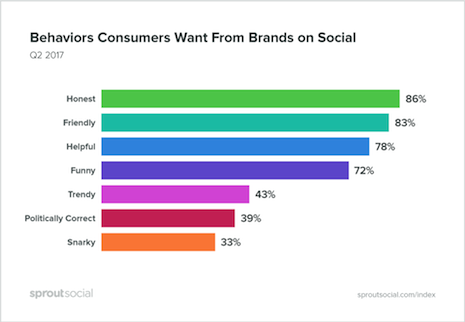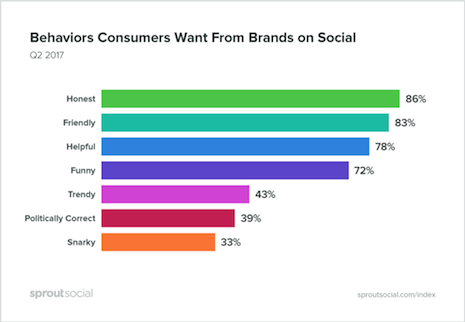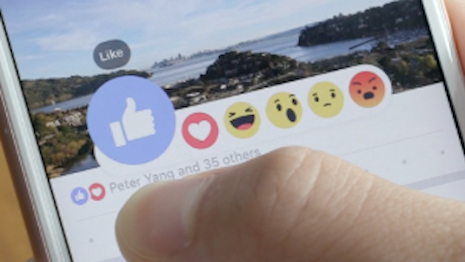While sarcasm and snark are themes running rampant on social media, many brands are attempting to adopt the popular tone for their own in an attempt to appeal to consumers, but this concept could be detrimental.
Sprout Social has found that 88 percent of consumers become annoyed when a brand mocks its fans on social media. Marketers are also looking to politics and societal issues on social to relate to individuals, but this is a misconception as well, causing 71 percent of consumers to dislike this kind of brand behavior.
"Even though brands such as Wendy's, T-Mobile and Denny's have received a lot of media attention for delivering social media sass, this approach isn’t quite what people want from brands," said Darryl Villacorta, social media manager at Sprout Social, Chicago.
"The Q2 2017 Sprout Social Index found that consumers want brands to be honest 86 percent, friendly 83 percent and helpful 78 percent," he said. "Further, while eight in 10 think it’s 'cool' when brands answer their questions, on average, only 12 percent of social messages that require a brand response actually get one.
"While snark can help brands stand out, the risk might not be worth it when it’s responsiveness that wins customer loyalty."
Brands on social
While politics and mocking fans are subjects that brands should clearly stay away from, comedy as a whole is not. Almost three out of four consumers appreciate when brands look to humor on social media.
There are some exceptions to the rule. For instance, Wendy’s saw its recent tweets go viral after it responded to various mentions with sarcasm and insults.

Graph courtesy of Sprout Social
However, this should not be attempted by all brands. Wendy’s happened to be the right brand, at the right time with the right content.
Most consumers look to brands who value honesty, are helpful and friendly. For instance 88 percent of consumers buy from brands that are honest, 78 percent support helpful brands and 83 percent look to friendly labels.
Messaging is another tool that is growing as a medium for brands to connect with customers. But, Sprout Social feels brands are not doing enough.
It is much easier for a customer to message a brand or retailer through social media with an inquiry rather than call or visit a store. On average, though, marketers take up to 11 hours to respond to messages on social from consumers.
They also have issues responding in general. Only one out of 10 individuals receive messages back from brands.
Even though messaging has become so prolific in consumer behavior, luxury brands are either lacking or severely absent from the strategy.

Graph courtesy of Sprout Social
Facebook Messenger is the clear winning platform for B2C communication capability, causing 81 percent of brands to have a presence on the application, according to L2’s Social Platforms; Messaging Insight Report. However, only 50 percent of brands reply to consumers within the hour and only 10 percent have chatbots (see more).
Consumers want to engage with brands on social media for the use of customer service, which makes this a serious problem for marketers.
Additional insight
Also, plus-sized model and social media influencer recently Iskra lead the way for the top content coming out on Instagram from New York Fashion Week, as influencer content saw the most engagement well beyond designer content, according to Chute.
Michael Kors and Vogue were the luxury brands amongst the top content creators who saw the most engagement surrounding NYFW. Fashion Blogger was the top hashtag discussed in relation to Fashion Week, alluding to the rise of importance of fashion blogger Instagram influencers for NYFW (see more).
"Being funny or snarky isn't as appreciated as the media headlines or engagement metrics would lead you to believe," Sprout Social's Mr. Villacorta said. "In fact, only a third of social media users like to see snarky brand personalities, and a quarter would boycott a brand after seeing an off-putting social post.
"Brands that want to attract and retain customers through social should show some personality, but consumers want a focus on customer service over comedy," he said. "We also found that millennials’ attitude toward brand personality on social has some distinct differences from that of their older counterparts.
"Millennials want to see brand personality on Instagram at a rate 75 percent higher than baby boomers and members of Gen X. And in terms of how brands express that personality, millennials are 25 percent more likely to think it’s cool when brands use slang, and they find brands making fun of competitors to be cool at a rate 20 percent than their older counterparts."
{"ct":"ni+wdUBGpB14MJNKf38\/sbzBmHnxh+bGznR28axpMugSRRuXC9qs\/42+Bg19jigzyS\/m2IZFP9yic3J662CRfMKOk12ELejz4PDfTXhYxcZBdbfj3qY+ioewQFeaSVNqsy7r3fPFG4pX8m62AQXpoC\/M1wvD2Gm919BM0liu8fVaeUadjd\/YNB++qelRfjNMla93bMf4hJ13ZeC2PvDwIquUZopAADXRyuXnkMtXR8vQGqsss8DBZBfTgJ4c2qrrJlVD8mjdCcYoxVdKowhW+vDrhLomPK7KADgYOe21Y+27GrqW9pB09iwTFwukRp0bDMhJaRorqHhWz8F8C5O7mocjwXlRghQ2EHaAGsutZcQCpf7ARn+1j0uijSuc30oTXhEeJ6r9JCce46n41ErLNV\/kZdTJ7bG3OccjcSOS0deNAQOE7rKTvaYlkBPJGFZ8+Jrf7LQ1PWgPIHkWrg7B2fZxgKUhPSH3VzeSzaVOgoAIxD2giSJQ92BVLe32tlfM9o69gzPOkV42aU8ISlhu3FgD0\/\/4T9nSYvy3fffhq0HDbPlpgSQKsrqwBJq1CQJB5enSI7GsMcCMNF4KlNNf5vuzW+uUGAldkBbTNAcW+I1gFdsGt1xBwrNQsMNBA6tmhUvAhV6lgx6Ev0IQx133XaaFoOwy5OzncJaCOaXylgIpjh9uVGOVyBpTl8MnTaM+\/YGC9OQFw1RpNQKVyBvmMyi7hLG2BxDpDkh3bX0KG4GMdfiOcfoYvTujPp0hBL1oEBA8TIaopIgOg8DRw\/NpmXzDfCpVNaqXnoRejPTqmQ7nHeJb2ATnpFQoxc+06JE2HLP0WPb7q0CcO\/ZL5rpWf9WtRGNZcqgPX5sSeWCUaDdR7IpAO57eXid8T+C220ltm9mqL\/jwWnr6dD7rzi21E1de2\/Eg2x8E\/R2Xx+5LpYFl5VCtwBkkSKXe5CRS2wOhq2qII+OjgSQqQ\/ckpV5IZH6CSRWSk7+fnXTz0D22ZPRAVC8Hkp\/AIhbVZvnVLzgy0uqmypLk+CfHy4OHsmuPBMR24w2tKSx05QanxUFZaR+LxlnIuNivlE4DJYXIrdcsw5PRoX6mh3EoeOwWyR\/SBbkxAI\/KgD4ivPP74rMrMCwiJNogVnFthc3shWyz8kVuxw2fPgQvusTHeVmWG4SeY2NGLZLcqeHK18SmBdWdnqqQhUeoFOSU9tmKNrrFKWaXWsObOoCz6uDF0xnw2Vh10kRGjzgK5GVSaFpM3DnC+5so6gjpRGTxhoRPoxBNnNNaUP5xf+j6ydVJOMpDeqMitTCnuORDlS4Owz7Hz2pp8Qy6bjRJVwLRTRE6PyLwRbfsaLNWqidTPPorkjI\/zApTqT+EKKJN\/JxE7H6l43YA0azSFD7l0PxHmj+rD3rZZwvOfdIZQoW01KiK7d4O2POkhR\/nZCLneyvl0HHZTUkprv9fisUvKwa0xEMTbHRdX4nYXXbhD4JZt6wPvIBNswLgrPmrf5Oph6PppB6sQGugyprehYj8EXLS1dYp8r4vQXxkaJ+q6uHSx0fDt6BKr8uVimpH0daXLiBQ+sVTDp38cWPL10YTFYiz5AOTXVUnUQPvqB3cmZ7ewJ2A+AbP1R+d2bIVDw2bHnJ5W3N9mgbAqRZTshrNWdpWRaSyxvgkwvRE\/k7rhDFDi6\/QgODbFefBxRv7s58HdesChkFZ1QUpZf8x344ncTEcb3mBQBx27jD8fKpHFJeW7uR0PIHZLpAFWSoSTBZyZ\/gRy6WPNoNpuH5gBOldfpPspzPlVzt+wz\/eMb6eF88TFQXqGZ1BtiJ9pOzmsxIRdil1Pqec4\/MOZZ6OLg0VXXhdvLAfAW\/qsDQ51rNAQ\/fxKxTGnybDkv7fRtdV2YXVQjvELdEW9C1MQliBAK5eaOF06eD4NNwJC1ysVu4hTRj3Am6NQI87SUyqspI17EHBfZAd0yhMw3kPHeY6DkT+rFGJQutfuWjkq1pvZxAA1eKBtLAjFLPn2ZFncN3ECVv\/VSMyCXOx3zsfl+KplujV\/fAFNMYLsU6OApK+bBxxWBfQGF8WjTpp6mjfUARt7Qmuw\/E38efoVETjgDa1UsnAsL7CrCRORRtGFncaE42ohGDmLAc89mvqTgodA74K99qGnx6tLxxiWZZsG3fsLSu01+H+Spz19LTmd2z7gJTQJuweQbA0kW\/AeflrSqI1so++qDZylyXGb6GdiDke3pUMIYTIx55vEdzxifS+i4hkQGR5AaES6acnrqz+VySXmmjt3qY0xEEhgPeKDpMrRGg2GpJv6l1ss3jCUQWwbXYiuGR6OmPBozbFq1Me1ZZ\/4+ZsdKVmCGLn4fUgC0bTXymwTjOM6Utk16OQjyy+0SGEopUy3sykfZ\/2dna13aKmsgiY7\/X9ZldBjNyacfgns\/0J1YFXcZf0CoDlOzp4TazvqVByOVi3IG3+xT1kJIqmsH2iyFXQlUJTTSTib8x4Abyo17Kr2HPKN3PUWeVQ5MgF84kxB6Cy71Eojqg8Ogf+i\/XHJ2O93\/MJOqC+WYIOzByF4acLILMeeP8vkfvfeJshtchqiilujvp\/+wIcKF6Taaq\/4ZUhTV\/5d9\/bcICjOdn9cFF0q7J2HkfvOZWjsv7SfiQl2kx8DkNnpuWZA2bAi5og+gwssNxLPAyQbtWk484fzGbydgD3hXFwjd9hsbA5B7j\/BQRQBviYqxo1XDp2340w23OnSRNCJfEAlPDSxpJygr7eoZQGe2DkacwlHWSlmxq6PHCD\/jFEGDIi+\/2pJbfhQIEIxuaO5DRxlTzp+wCH58dkg2YYpin3wUq4e9zjXlFK1e2LPCuWf6tAui0f3pJ5ErVF8q55hUIGbuWfQHg9GdGyeLxKFRKZhqZJXyYGKS6p08UeZvls3mi45l5JLm27qBMRobZkCZSYWyPTdG1+LEw1182MGhjPtNmUToPuFKrzVqDrDMolj2ViTLeNFLKtnaauRU05cdk1oqmm1vxwMDvA1yYyyG\/GWQieLAi5QuOhGMwkpqNd9jeK87W9k0cxO\/LHHQaELTwOxYgL3StiDu5fhgklL5nLL76NfTPgiqbePK+pTOz+zs+zsc3hIslbHKXY8Xhu6GrnioSiei7IdQQnQQzVFfySQpNOKLzb\/TMCDtqUyoAiXTHBofVhj0tEuLOaHVOrOfEF8yTHGVbF00tZeEirSXrdE6xT8QvR674eqLugCLbZ9z6WRGnkZp\/99VdcOKGLVajgNw0f+exi7LVbOx7\/aJKz0gFDkYL5jogMmfqfIphvjJaWezvuUjPfyaubvu0IOVLWyteTTC8L5OCrfAKE84wohvV2F8SDqqGK+QTDslJ1uVK13sfa\/huT3ZBdfdQfkBHIKCmg5AbXJFCDTyh+ATzs0k8y4CJbflHmpf6KRZ+kDQxqYKXnZvI7gYWFtAZAn1tCXQLxI5c3ESv9fbNyzcqXqX\/3KbuOSXgyRU9adj9sH\/0UxPljgUwXhlOMdlatfK7b87U7OpzSnPjhCC9sRWm4x9axhSOT+1z6HZqqks48\/d1fEsHuotBdr3J8cci06YJIorK2kAkwm1VEM5NAC4scnhrdnCjqvosIJZGdA99cA0SJ9\/oQQHhBoLoZaEfdVNlkOwPFeb636hZHDto6C2fwDBSyjiaajJvj\/LgB3ynLzOlp2P6KKIEghPYeKLhYc+7Yo2yFLasN41KzPFdMHUOmAQlJ+Uvqr6J3lqPoJfpuCMi6UmQ9isdS6nu7h+bwlO3x7sJK5B42Ws9U64FwWwlU2dzP8qU5dozDyIDazBDPk68adv9YZ\/5fNfg0FVrsRDjboHxgo\/Q1ItedgkURP9q4EPescNCbi2+vh8X4H1uzLpTFN8VSC1VaxKT5nf910E6znIFBs7LPLhgrQFg1nIHeKFqLAdYG+yjGeZx0uwxdNuLrGFZeYmafMvFlJo07l8twkM5rijxNsff16qs0odm4kus6n0\/HrTM2gZUIHfweVIOrZsG55LEMaQ1fTiAJoR3HHoWKAtYcYDR\/pIX1O+0mShJhvJc6QwTZp1k98pi7TaIuhNvGqh2BF4Ftmul86LndfVXfYhjHLsucXLJ54Kz\/dAS79UVZZt2R8\/2nyTHqqceWU3gaCN1uYW2lLH58Qx0eik+rCxNao4RE+K0ty2Cutzgrobd8oBbktohSJbQeShqtKPTIRLBV269nzW5m5OwGDEFLhBxmCUjBW0Xlc2+vTjTPsjcMyIIoJeSOu6+LxKWqXFw2JR1Xq7SHp\/m\/d1W\/0V7oJgR7a74XdE9VUbSdiwH6H7auInAwpIST4dy3SKqY55a0+b17NbGFo4YxnCstV+FUlezvVJCWZeLc32S2NTixg0PyM3XlzfE\/B1gX0YTtWXV8LhSP3H+Aqf0sIVRCzLPbJIhZGXTp8dcYFO1Ue1jxkjbU5PLEPN8SyXLxN6ZFhzOlGfiqwn5lDjw+GNpNyG1nYz4LfWJWMJYylxntFzTe0ltZxJWYc9TwkbZAIU9QC8jzEHNSMSfk7tjTVhqm+rbJkyLytkVG+gfAjYE2L1mhPrdqiGAYjaHr+hdFCNuSvAVC4\/KmAJvoEF\/rBPbqrQn4gHH6IQ5lCjAxAujbiy47LXCeEJvtMVXyG8i+BxuM6cJTzHoFvOTV57zKFn1d5Veeb4taKNtcEywo7f8O8PJlv3C0p\/ZV0ZkaYD4ZOBE2uO+s0qP0QibP\/Xfl4N6+QLUYCseRiFzXYajZ2rsigqpJyg0pjl\/tymgkMCwxRfOw1VdNnzVdcB3wMQqpnd1i\/YkBCeoSyQH7Uaxs6RdinVdKnhTd95XibFdIbPM2HJtcn86eCsazuzSanv8SDcgORVeZr6sMJGdQs96ePoZKc09UpD6I8n0rGbY5AXUgXZo0uiSNTTg1kHjxmF4yHjpl4f8L+vBprr4qBkfwvyR2wMXoMBAhaG4P\/l34ovXz6CubJJ0nadWB7pZOahpJ+D+HPe9IxqFYXnQJk4USEysP25l4389K9xGMHMOtKvIMwnqd6\/UwBE5NOuVdW5NG8RWRk4ws7q68mRyK2G83j3eVIWbsIWSUp2SXC\/711Z8DsCsXgTQAgQD7vi0Smx2syqCNP+SD5sg9wJYn+WV2QHNi4E4QrPH\/2iIZVQDLz82c1F58A485aHPF4LFq7u8PhB52\/sIvW73iwb87G\/TXFeFaWrf0GlxdQHQo5WE0\/IrMccdx0dfxJ0KI5CgwO9QdJayl21IlN1aqRCVzETWb+Xlp\/SWU1q8sZpzUEnZZM6hrbI93ABFT36tdWkD282XGOXc5YF3HEjCtPS5ucwn\/A7PDyYm7Ba6KjoaVYv7Vbb1SXr3ujIHMAEjQdS5KVfDiMzRuz7LUE1jnH4sY1x1F2iXBIH3nNWJBdr2gZoyy0i6T0xkypE+dqMoebZaMTiCIpQwzZDJtDedxCiJmtXksuq92m5KqdhMfRIDM0oga1JvOr3hzCCg7RREtzgkDYBsTzxRhA8b9VRWfkKaGMb3Fr5yD49Jw9Umd3KptauRk93Wf7lisnE1BlO6is\/6ewod226hFSgjhl\/rx9hwEvvdS0hrw1wiV8XYV\/lK7M0YICX93xjpt0kT4em+9lvjgSt4DgpZP3oTfAJVPB6mvWicQ+GiYIawaxfwrkg9ec\/emT0H10yvXuaXkBucqp7uD7TJZ697mGOMKEF4rwyX\/9tOftJ6E6ycPuLBLIgw1iwUPmhSaLgPP8Ykynt\/tQc7rQLA4AMlI4hGItXOXF7F9TYEuTZcBFj2+TDP3BbEgAjwDbXg6pCkWelYIMZh0e2tcdxH\/CTz59nlfy3msqiOyCqOViel2Sc5adpm3uPCRZksGJiNZxoVZrcPmVJ+n1ShRmCnnDvwHTIAv8ugO4ZM3aHY92MFCOmXv1bTFzDxo7mE+ar0x\/M6dg+1XtLzAXGkjlw9M0UAITbcMxRymZ\/J4UgZJBdogtb1tEYXtUDCUlpOw2lRMbfCz5YBxE6o5iQ1SdPVjkMFYXdlkxxcC1ZpGyxKBAsrO0kLlW64d+nISR6uiU39I3alyKERHx2k0viooZ2u2c6bnNupS+V59xSJGojxDhrmUotwVnwY1DoP5VT4V4lM2pKfyHjGgwEZPqjCOw6la2HDdDsKYXD6gHf6Is1WAE4Qa2kfD8IXpkWJJ\/6bPZ+Bg9uV9OUA6fVJCiBC9flOWjNHmwuM\/MGt9j7mMpqPeWpQ+n9Xn7vWkDyFxCrWb2sSeWmX4LkwLE4WqmIhX8iaVfNAG+ROU0hLL0yuh+ygy4V1ZnLKlCWidaWVCa0y7bJMnuDrkBAeR2qFT9k5j4u9eYVP1cLTO5N0QmGisaT2kKlUePnYEj1kjbowN9H0mf7jdqg3J3vLwvIenjRrwW8+JBTc6JdFHpAYiGtV+MJOtyzizVFUIdzb+Lr0TuTZZxyR59cTPIQGZsM9uRKr4Hl1gAUXapbYInYyfaiNNwKKfX9aq1WvKn9X1p3lr+xWJuvdME8zgyem97oPJu85v56UKh2Mmh701Zc2lTqR21LZsn9GYDc3p\/M0F9a6vpFsXUZvOZH3TMfZPYz6UaSttr7j1uILunmZskqyfrdN\/B1sC8WCB2FBwis+K\/VjaM99CFJ6+XWyFUrpAlawWoHGfQcP5J1dmc4nQ4\/by\/OZIOzE5HswvxbktW8yvkZgMsWEHSDkSKCv+TiiCmx0y+9M1sjpnAAUclf3omtiMbZLX3\/lSQpRekTfXkMhbAYnQfPQ30AEFJ4nzXGkztC1gLZ7Oa+9h1eOmasvCNk5QV9ylxq0OnOp5e+ssKnfLv44rgxBDRlG+kLyd9VD7QBcn9b3Gz9ISY0wt8Ds7ukSSaHele1Rg+oQ2GhMsGvDcxyl8lXjdDNhstB6Rjv1n6Q+U+O4GT8Wl92k+EIQKOWkYtp\/eZECAGrXKaW2LpRTpNqR2bE7S6WTFmlBIkPCzStFUC9PyCB3D0CsFAtomWzX0JznZJqDKTcs1OEqVfsHa0sjXZ37aoHg5XhfhRK5ckuXv2U8WpPqvdCMSc9dCVVhASM0tXp4nFaMi3JyVjdxPKhoC\/Av+Vg\/CPLfn5x5XJ+\/\/je0BoTrfE19MH7WmIuQa9snzIpGSSMPFNAeOby3nv0Ygvl+bv+uOVXUCjj1dhm4L8WuEgdlW1s4WIuwm0Ix\/YYILUv5Jpa12fdR9SvktUr4xJ\/gxCFTABT3tOepmrz+qwnL4vb14\/sLDDE5DqdFNcrwmVG\/Kjv33hYxUrxp5NXsOfz5tZfWL12UyHFOHMEXSkowcESdhwltX08VcwM9HTWZBZRoQ+nm\/R2btl+g2QJwqNOeQY3bl1iozAIwVxAFwOguLkGsieIXqGY8yuwmUOyVC0gWOx91bt1XodrhGBQNEHuG4EwYdRgvkxEvV2cu269SAxOgol8bAiKIVvXx0QNkUkcWQjwjQpVCeQbxYaZfo6OnpLbYsS5peAOCGFJATG0EVFRnBtUOfBIfiTyDPjsaqceNkZWWUG+JL8LRRXJNAhjPuTmp37OI9aE+lvHAfyma5oWycFJpJ1wHwzUPyt4UYQHYJ6ZT4iR8NMHzHL+oBR3PwKVLPDQfdYjZxb39lBNuHmCXl2sWK\/neHaUchHqZmG3do9pnTE7NSZ7FsUE0LuYN7rKpNcXwlLE6XhpyePwYa2Dkj45cPB9u6KcKMLXngWQS2454c2Bs\/B5T9nTcT5IwlG5kvYSQrCRQjnpmJ14+Xy3hi\/NFnaz16aU5BpEkDCKnBNWdWLCJ9K\/U8WF0mlMxfWeAIhGv5bkoB4tILOaqGtA1sVHQJnRKTkX1QFJspwT\/OqzczKL4EDcyOUQitywSsgAC4110W\/syCdLSNgEGnndwg1whe5M64lqiawuWYZa+1cYzCoQTXycvHPAmvSMBH9HHYfmopGIeb7oDdvmXxeAd4zB7sqAoLJi\/5rnkf1i6\/rZl26zQpcUtm1A0bYRabrU+ZwlLwmXYOMRAdBxQrOVjKUOTdn3u40z6uH9jgFNdre4np4N4hnxV5jtTp0Tao6NVG2bPKzNar0FycIORkBSU4zCkeErtG5X3pF55vaMa87hEoWVEtSD0voJ0Kn+nAJD9\/shPxfpibIpbekNNRG8l6FFyXCsDrBXuEyRnFTORCtzQwCxRaoVzJ3pOZFCKOR1bmjm208qBUlY7cEM6He51HY7tnBIM=","iv":"11eb4729a9f064d6a141804fb4f8b46c","s":"a6313eea4cba4a64"}

 Brand engagements on social continue to grow
Brand engagements on social continue to grow